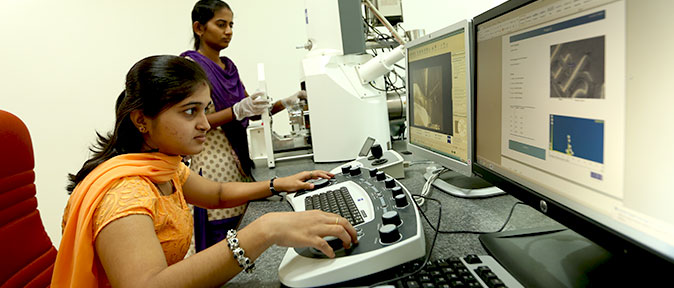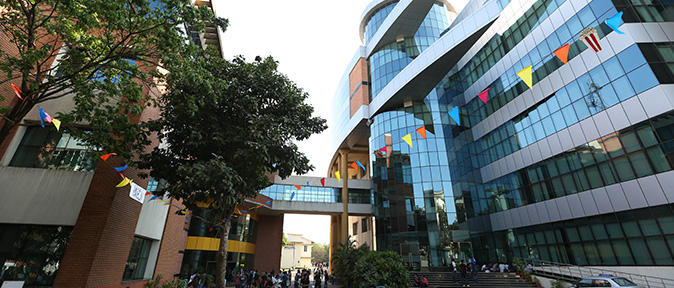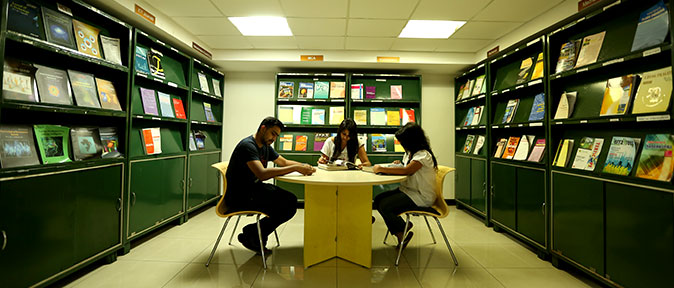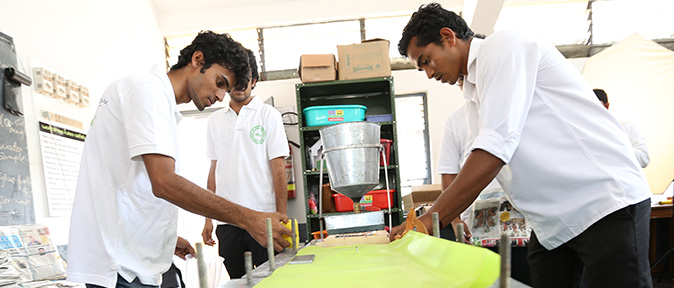Overview
Started in the year 1972, the Department of Electronics & Communication Engineering((ECE) at MIT marks the golden jubilee year in 2021, fostering excellence in teaching graduate and post graduate courses. The department provides undergraduate B.Tech programs in Electronics & Communication Engineering as well as Electronics Engineering with a specialization in VLSI Design and Technology. Moreover, it offers postgraduate M.Tech programs in Digital Electronics & Communication and Microelectronics, along with a Ph.D. Program for advanced studies and research.
Department Vision and Mission:
Vision
Excellence in Electronics & Communication Engineering education through research, innovation and teamwork.
Mission
To impart core engineering skills in Electronics and Communication Engineering through effective teaching-learning practices.
To provide an academic environment that promotes creative thinking, teamwork and research.
To enable the graduates to face societal challenges and provide holistic solution.
Department Areas of Expertise
- Signal and Image Processing: Department forsters the research in the specific domains including signal, speech and image processing also the interdisciplinary, medical image processing
- Analogue and Digital VLSI: Group of dedicated faculty work on funded projects on Analog and Digital VLSI domain
- MEMS and Nanotechnology: MEMS technology expert group concentrates on miniaturizing existing sensor, actuator, or system products. Nanotechnology uses the unique properties of ultra-small scale materials to an advantage
- Wireless and Fibre Optical Communication: The department is well equipped with research facilities that cater to the need of latest communication technology research
- Embedded System Design and Application: Department not just has expertise but facilities that work on the embedded system design and applications with emphasis on IoT
- Information Theory and Coding: Department with its expert faculty members provides excellent contribution in the field of Information Theory and coding especially in the field of data encryption
Specialized Labs
The department provides dedicated lab facilities for running lab-associated courses to undergraduate/postgraduate/research programs in the following areas of electronics and communication.
- Advanced Microwave and Antenna Laboratory : The laboratory aids in designing and developing application-specific antennas for sub-6 GHz to millimeter wave frequencies (up to 40 GHz) targeted for wearable gadgets, handheld wireless devices, IoTs, and mobile phones.
- 5G Wireless Communication lab :
This lab has GNB and RAN, which will help in transmission, reception, channel estimation and edge computing with 5G architectures. - Digital Systems Design Lab and Electronics Circuit Design Lab : Consists of hardware trainer kits, dual power supply, digital oscilloscope and digital multimeter.
- Computer lab: For designing and analyzing the analog electronic circuits, using software simulation tool called Multisim.
- Electronic Systems Lab: Consists of Labview software and MyDaq hardware tool by National Instruments for developing various projects based on analog circuits.
- Microprocessor Lab: Consists of ARM 7 and ARM cortex evaluation boards.
- Communication networking lab: Where the experiments are conducted using Qualnet simulator software, benchmark LAN trainer kit and C/C++ programming.
- VLSI lab: Consists Verilog HDL, Basys-3 and NESYS 4 DDR boards, Artix-7 FPGA.
- DSP lab: Equipped with MATLAB software, code composer studio simulator and OMAP-L138 DSP development hardware kit for applications of communication, speech and image processing.
- Communication Lab: Equipped with NI USRP 2901 SDR setup for antenna and next generation 5G wireless communication application
- PG lab: Equipped with 30 licensed state of the art Cadence software for digital, analog and mixed signal design and other software such as Xilinx Vivaldo, Keil(for microprocessor/microcontroller)
- Research lab: Equipped with HFSS (for antenna design), COMSOL 5.2a, RSoft OptSIM
Department - Industry Collaborations
- Mutual collaboration for academic and research activities with the Indian Naval Academy, Kannur, Kerala, led by the Department of Electronics and Communication Engineering.
- Collaboration with Bucolic Kailash Agritech and FMCG Pvt Ltd, Maharashtra, focusing on innovation, research, and product development, spearheaded by the Department of Electronics and Communication Engineering.
- Partnership with ELCOM Innovations Pvt Ltd, New Delhi, providing training and employment opportunities for students and faculty members, involving the Departments of Electronics and Communication Engineering, Aeronautical & Automobile Engineering.
- Collaboration with the Semiconductor Laboratory, MeitY, Government of India, for joint research and development initiatives, as well as faculty and student exchange programs, led by the Department of Electronics and Communication Engineering.
- Collaboration with the IITB-Indian Nanoelectronics Users' Programme - Idea to Innovation (INUP-i2i), for joint research and development initiatives, as well as faculty and student training programs, led by the Department of Electronics and Communication Engineering.
- MoU with Telecommunication Consultants India Limited (TCIL), a Govt of India Enterprise, making MIT one of the proud recipients of the prestigious "100 5G labs Initiative."
In addition to these department-level collaborations, Manipal Institute of Technology also fosters institute-level partnerships to further enrich academic and research endeavors, ensuring a comprehensive approach to knowledge exchange and innovation.
External Collaborations
- Teaching skills and teaching methodology – training program for young faculty, in association with Department of Education
- Academic Alliance Programs with INTEL and EMC2
- MEMs Design Centre (INUP) in association with Indian Institute of Science, Bangalore
- Student exchange programs with various institutions/universities abroad through IAESTE. More than ten students have got the benefit from this program
- Collaborative program with DBT, Philips and BoP Companies
- Collaboration in the areas of microcontrollers and digital signal processing with ATMEL, Novoton Technology Corp, Taiwan and Texas Instruments respectively.
Placements
The department is well supported by the institute placement team. The placement team is headed by Associate Director (Industrial Liaison, Placement & Practice School) and oversees the entire placement process in the institution with the help of department coordinators. Students are provided with opportunities for Internships, Placements, Pre-placement offers (PPO) in core companies and ITES. Department has been successful in providing placement to more than 85% of students with Average CTC of 6.2 and highest CTC of 20.4 LPA Microsoft, Intel, qualcomm; Sandisc; Samsung; Ericsson; Maruti Suzuki: L&T are some of the major industries in which students of ECE have been placed.
Programs
The Department of Electronics and Communication Engineering, MIT offers the following programs:
B.Tech in Electronics and Communication Engineering: The undergraduatd engineering course equips students with the knowledge in the fields of Signal and Image Processing, Analogue and Digital VLSI, MEMS and Nanotechnology, Wireless and Fibre Optical Communication, Embedded System Design and Application, Information Theory and Coding. The 4 year course consists of in brief, 15 Core Subjects; 7 Program Electives; 2 Management Subjects; 8 Laboratory Courses; 4 Open Electives; Industrial Training, & Project Work. Students can choose from a bucket of minor specialization as a part of their program electives
B.Tech in Electronics Engineering (VLSI Design and Technology): A serious crunch is observed in the trained manpower in every aspect of semiconductor ecosystem in the country. It has been estimated that total manpower requirement over the period of next five to seven years will be around 85,000 at Levels of B. Tech, M.Tech and Ph.Ds in the field of VLSI Technology, Semiconductor Manufacturing, Electronics, Electrical, Mechanical and Chemical Engineering streams. To fill the current gap, Ministry of Electronics & Information Technology (MeitY) has set up a task force to propose the required courses and curriculum to AICTE, so that the desired manpower can be trained at various levels by various Universities and Technical Institutes within the country. Based on recommendations, AICTE has launched the new course and curriculum on VLSI Design and Technology. Academia and R&D units are encouraged to jointly participate in this programme supported by Special Manpower Development Programme (SMDP) of Department of Electronics & Information Technology (DeiTY). To cater to this demand and fulfil India’s Semiconductor Mission, MIT, MAHE, Manipal being the Institution of Eminence is pleased to launch B.Tech in Electronics Engineering (VLSI Design and Technology) under Department of Electronics & Communication Engineering (E&C Eng.,) jointly with Semi-Conductor Laboratory from the academic year 2023.
M.Tech in Electronics Engineering (Digital Electronics and Communication): The department offers M.Tech in Electronics Engineering (Digital Electronics and Communication). This career-focused course is much sought after by students for its excellent future prospects. The state of the art infrastructure at Manipal Academy of Higher Education enables students to work in labs equipped with cutting edge equipment in the areas of Analog Circuits, Digital Systems, Communications, Microprocessors, Computer Programming, MATLAB, Microwaves, PCB, DSP and Power Electronics.
M.Tech in Electronics Engineering (Microelectronics): M.Tech in Electronics Engineering (Microelectronics), is a two-year program offered by Manipal Academy of Higher Education, Manipal. Students are introduced to the concepts of physical electronics, DSP and its application, bio-sensors, hardware description, optimisation, computational electro-magnetics, VLSI technology, design, and design lab. The curriculum also covers the study of embedded system design, physics of transistors and advanced network analysis, among other subjects. To provide a better learning process, students are exposed to seminars, soft skills development, project work, research and development and lab assignments.
Faculty
Facilities

Laboratories
World-class laboratories give learning a practical dimension

Innovation Centre
State-of-the-art Innovation Centre to facilitate multi-disciplinary research

Libraries
Libraries have excellent resources for reference and study

MUTBI
Paper tree - A green initiative by MIT students of MUTBI

Computing Facility
Wi-fi campus with modern computing and digital facilities
Research Labs
.jpg)
5G Wireless Communications Lab
Advanced facility designed for researching, testing, and developing cutting-edge 5G wireless communication technologies.
.jpg)
Advanced Microwave and Antenna Lab
This research lab provides complete platform for experimental validation of antennas and rf system designed upto 40 GHz. The lab is equipped with CST EM simulation software and VNA (upto 40 GHz) and Anechoic chamber.
.jpg)
Bioplasmonics and Energy Technology Lab
A specialized facility focused on researching and developing plasmonic technologies applications, as well as sustainable and efficient energy systems and technologies.
.jpg)
Device Fabrication and Characterization Lab
A state-of-the-art facility dedicated to the design, manufacturing, and detailed analysis of electronic and photonic devices.
E-Newsletters
- Vol 6 : Issue 2 - September 2024
- Vol 6 : Issue 1 - February 2024
- Vol 5 : Issue 2 - September 2023
- Vol 5 : Issue 1 - March 2023
- Vol 4 : Issue 2 - September 2022
- Vol 4 : Issue 1 - March 2022
- Vol 3 : Issue 2 - September 2021
- Vol 3 : Issue 1 - March 2021
- Vol 2 : Issue 2 - September 2020
- Vol 2 : Issue 1 - March 2020
- Vol 1 : Issue 2 - September 2019
- Vol 1 : Issue 1 - March 2019
Departmental Activities
AICECS 2024 brochure
Click here for the report of AICECS 2023
Testimonials

For me MAHE is a place with ample opportunities to grow professionally and personally.
Ashna Ranjan
MIT Manipal

Learning is an awesome experience at Manipal. This is the best place to be for students.
Rudi Rajkumar
MIT Manipal

MAHE is giving us wings to fly and providing us with resources necessary to make it big in life.
Shashank Tulsyan
MIT Manipal

MAHE has taught me the value of organisation and to be systematic in all my work.
Siddharth Bhasin
MIT Manipal

My experience at MIT has been great from the beginning.
N.J.Nischal
MIT

I’m glad I choose Manipal University.
Chaitanya Chauhan
Mechanical Engineering





